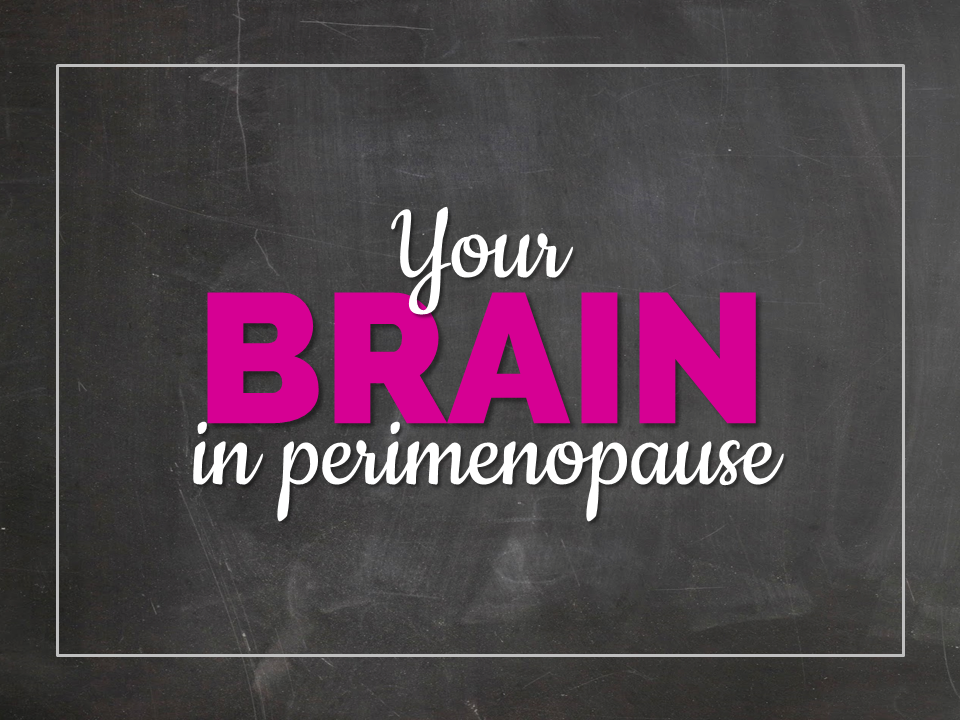Brain fog.
Forgetting words.
Recently I’ve been enthusiastic about (addicted to) the online game Wordle.
I’ve always been drawn to word puzzles, and what I like about this one is it’s simple and there’s only one a day (thank God!)
But what this game has also made me notice is how sometimes my brain isn’t working as quickly as it used to.
Words that I know, easy words, get stuck on the tip of my tongue.
And at first, I was a little worried.
Was I losing it?
So, I began looking into it.
The good news is that I’m probably fine… Normal in fact.
It turns out that we – meaning women in perimenopause, and even into menopause – aren’t just experiencing changes in our bodies.
We’re also experiencing changes in our brains.
Your brain changes in perimenopause
Recent studies, especially those being done by Dr. Lisa Mosconi*, a professor of neuroscience at Weill Cornell Medicine and director of its Women’s Brain Health Initiative, are showing what happens to our brains before, during, and after menopause.
Up until recently, there’s been a lack of studies done on the brains of women.
It was assumed that men’s and women’s brains were pretty much the same.
So, amazingly, the impact of sex and gender on the brain haven’t really been explored.
But luckily that’s starting to change.
Because there are significant differences.
So now, with new research, we’re learning just how menopause impacts the brain.
In particular, the impact of the drop in estrogen from the ovaries.
The brain uses estrogen to enable many key functions, and estrogen actually protects brain cells.
So, this significant drop in estrogen definitely affects your brain.
Specifically, estrogen plays a big role in regulating your body temperature, increasing serotonin (the happy hormone), regulating sleep cycles, protecting memory, and more.
So, when estrogen from the ovaries drops in the years during perimenopause and after the menopause transition, you get “symptoms” of this lack of estrogen.
“Symptoms” like…
- hot flashes
- cold flashes
- night sweats
- disturbed sleep
- mood swings
- higher anxiety
- depression
- and… forgetting words.
And these issues can persist and evolve through this transition into menopause, which is, on average, seven years.
Alzheimer’s and menopause
Researchers have also discovered a link between late onset Alzheimer’s disease (AD) and menopause.
AD is a brain disorder where you lose memory, but you can also get confused, disoriented, and may suffer with depression, speech difficulties, and behavior changes.
It’s been discovered that because of the drop in estrogen, the brain is less protected, and plaques can form which can lead to AD years down the road.
And this may explain why women are twice as likely as men to develop AD later in life.
It’s also been found that early onset menopause (generally before 45), and having a hysterectomy or oophorectomy, increase this risk.
And, although hormone therapy (HT) hasn’t been shown to lower this risk, lifestyle changes do.
Lifestyle changes** such as…
- lowering your stress (because the stress hormone, cortisol, decreases estrogen even further)
- eating a plant-based diet
- getting regular exercise
- getting enough sleep
- being with others
… can make a positive difference in preventing AD and other lifestyle diseases as well.
And of course, the earlier you begin to make these changes, the better.
The good news
The good news is that once you’re in menopause, or within a couple of years of the transition, your brain adapts.
Your body temperature, sleep patterns, anxiety, and memory tend to stabilize.
And it’s also important to note, that although memory can be an issue during this transition, your cognitive performance isn’t affected.
So, you remain just as mentally capable as your male counterparts.
However, I think we need to be mindful of these years leading into menopause.
And have some compassion for ourselves, knowing that we won’t be feeling like ourselves some of the time.
I also think we need to talk more about this.
Women in perimenopause and into early menopause make up a huge part of the population, and our relationships, work, and well-being will be impacted to some degree in this time.
So, although menopause is a normal part of a woman’s life, this transition is challenging for most women.
It’s important to recognize that.
And to educate ourselves and those around us.
And to do what we can to help ourselves including making lifestyle changes, and maybe even hormone therapy if recommended by your doctor.
We can make a difference for ourselves and future women by sharing more, in a constructive way.
How’s your brain?
Menopause was never spoken about when I was growing up.
And my mother passed away just as she was entering menopause.
So, I rely on books, studies, and other women who are willing to share their experience.
And now, with my focus on health and wellness for women in this menopause transition, I want to share with you all the amazing things I’m learning.
And I also want you to know, you’re not alone.
And you’re not crazy.
You will get through this, and I’m here to help.
Keep moving forward my friend,
Debbie
P.S. If you’re struggling to make lifestyle changes that will improve your brain and body health, then I can help. Just REPLY to this email, or book a time to talk with me. You don’t need to do this alone.
NOTES:
* Check out Dr. Lisa Mosconi’s Ted Talk, “How menopause affects the brain.”
** Also, check out my other posts for more on making lifestyle changes:
Effective exercise in perimenopause: https://debbieharbeccoaching.com/3-ways-to-move-to-lose-belly-fat-in-perimenopause/
Eating a plant-based diet: https://debbieharbeccoaching.com/should-you-eat-a-vegetarian-or-vegan-diet/
Getting better sleep: https://debbieharbeccoaching.com/hows-your-sleep/
Reducing stress: https://debbieharbeccoaching.com/keep-calm-and-change-your-life/


